Jean H. Lee ’92, JRN’95 looks back on three “illuminating” years working in North Korea.
Columbia College | Columbia University in the City of New York
Jean H. Lee ’92, JRN’95 looks back on three “illuminating” years working in North Korea.
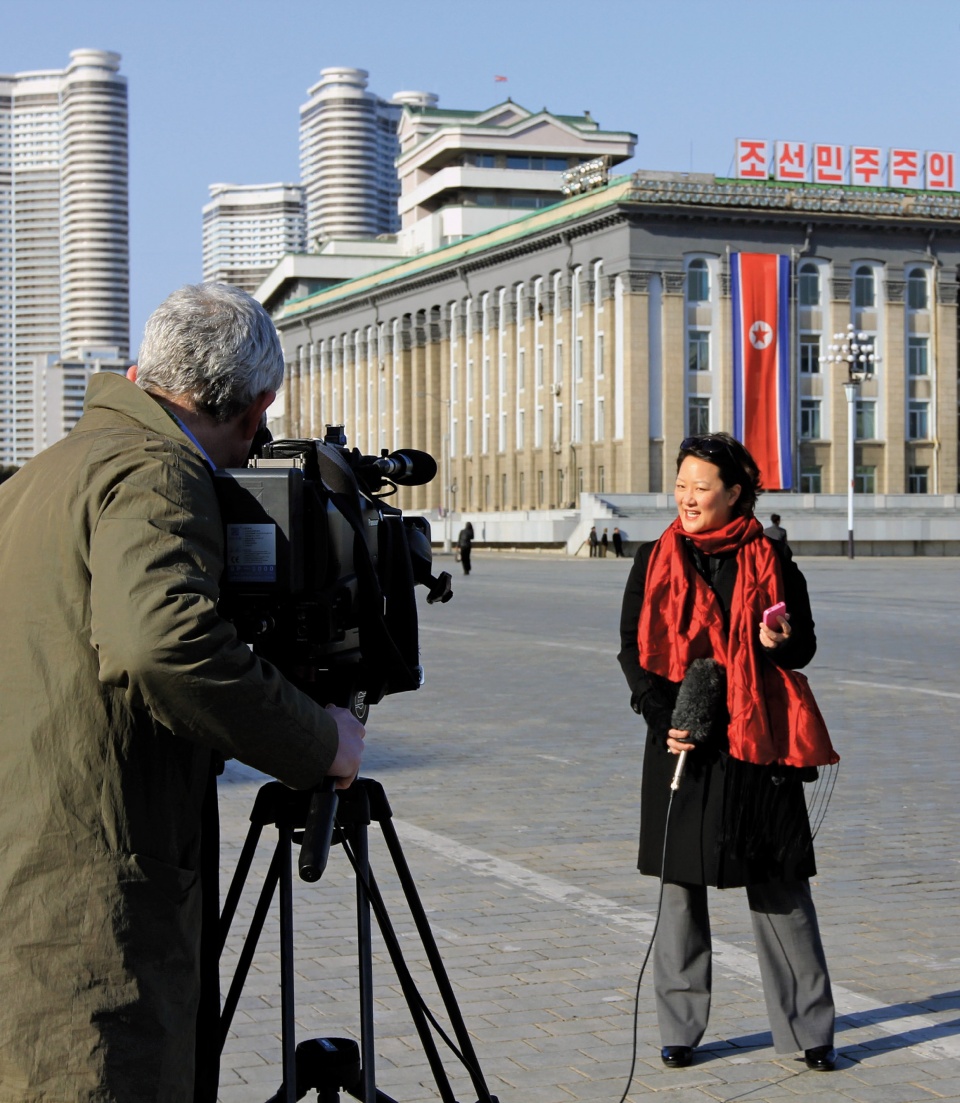
Lee prepares to give a live broadcast from Kim Il Sung Square in Pyongyang, North Korea, in April 2013.
COURTESY JEAN H. LEE ’92, JRN’95
As the Korea Bureau chief for the Associated Press, Jean H. Lee ’92, JRN’95 reported all of this news from the capital city of Pyongyang. The day the internet service went live, she tweeted, Hello world from comms center in #Pyongyang. It is considered the first Twitter missive sent from a cellphone inside North Korea. “It was a significant moment, connecting North Korea to the outside world,” says Lee.
In an extraordinary three-year period that began in early 2011, Lee spent most of her time working in North Korea, which rarely grants entry to Western journalists. In addition to covering the rallies and military parades that have become emblematic of the communist nation, she visited farms, villages, schools, factories, military academies and private homes — an unmatched level of access for an American reporter. Lee was responsible for officially opening the Pyongyang bureau in January 2012, making the AP the first international media outlet with a full-time presence inside the country.
“Jean was there when news happened,” says the AP’s former chief Asia photographer, David Guttenfelder, who helped to open the Pyongyang bureau and often worked alongside Lee. “She was there for some of the most heated moments between North Korea and its neighbors and the United States. She was there when North Korea expanded and tested its nuclear capabilities. But more than that, we both had a chance to see real people with real lives.”
Lee was the only AP reporter allowed to stay in the country for extended periods. She believes her Asian heritage — she was born in Minnesota to South Korean emigres and is fluent in Korean — was key to securing such unprecedented access. “I didn’t look like anybody they thought of as American,” Lee says. “That worked to my advantage.”
A decade after her pioneering efforts, Lee is now a senior fellow at the Hyundai Motor-Korea Foundation Center for Korean History and Public Policy at the Woodrow Wilson International Center for Scholars. The highly regarded Washington, D.C.-based think tank informs public policy debates about the Koreas through research.
Lee hopes her work will prepare journalists who will be reporting from North Korea understand what they’re getting into, while allowing her to continue processing her own experience there. Working in an impoverished country where life is rigidly controlled by the state — and where, as a foreigner and a journalist, she was under constant surveillance — exacted a mental and emotional toll; however, Lee calls it “a dream for any correspondent covering Asia to go to North Korea.”
“As traumatizing as my assignment was, and it really was traumatizing, it also was so illuminating,” she says. “That’s what you want as a journalist.”
L
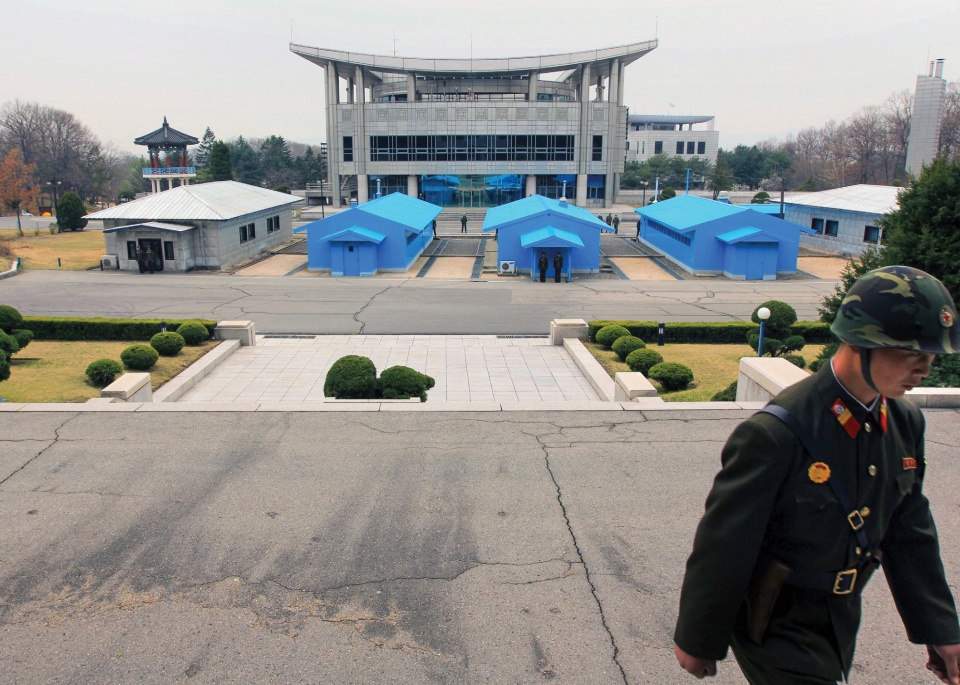
A North Korean soldier on the steps of Panmungak Hall, on the North side of the Demilitarized Zone that divides the two Koreas. Behind him are the Military Armistice Commission buildings (guarded by both North and South Korean soldiers), the Military Demarcation Line and the Freedom House, located on the South Korea side.
JEAN H. LEE ’92, JRN’95
Within an hour of arriving at the AP office in Seoul, Lee was given her extraordinary mission: to establish a full news operation in Pyongyang, where the agency already had a video bureau. “I remember thinking, ‘I don’t even know how to get into the country legally,’” Lee says. “How do you open an office in a country that considers your country an enemy?”
But Lee had no time to ponder the enormity of her assignment. North Korea leader Kim Jong Il was a no-show at the parade, a stunning development that suggested he was incapacitated or dead, and sparked fears of political unrest in a country with a nuclear arsenal.
With no time to settle into her job, Lee had to mobilize reporters around the globe.
It turned out Kim Jong Il had suffered a stroke, but, according to Lee, he was eager to reach out to the U.S. to help chart a path forward for his son and heir, Kim Jong Un.
Lee visited Pyongyang for the first time in 2009, a few weeks after President Clinton met with the elder Kim to negotiate the release of two American journalists whom North Korea had accused of trespassing and sentenced to 12 years of hard labor, presumably to use them as political bargaining chips. “It was a really nerve-wracking time,” says Lee. “I thought, ‘Am I going to be the next American journalist they’re going to take into custody?’”
Lee hopes her work will prepare journalists who will be reporting from North Korea understand what they’re getting into.
Nonetheless, unsure that she would ever return to North Korea, during a stay in the capital, Lee took a calendar from her hotel room as a souvenir. She was “flabbergasted” when she checked into the same hotel a year later and was asked to pay for it.
“It could have been a very serious offense,” says Lee.
Eventually, Lee became the first American allowed to join the foreign press corps in Pyongyang, which gave her access to state events. “I think I was seen as part of that larger message that they wanted to send — that they were ready and prepared to open up to the West,” she says.
In December 2011 she was in Beijing, waiting to board a flight to Pyongyang to inaugurate the AP office, when news broke of Kim Jong Il’s death. A mourning period and transition of power followed, resulting in tighter restrictions for journalists. “All of the ambitious plans I had fell by the wayside,” says Lee.
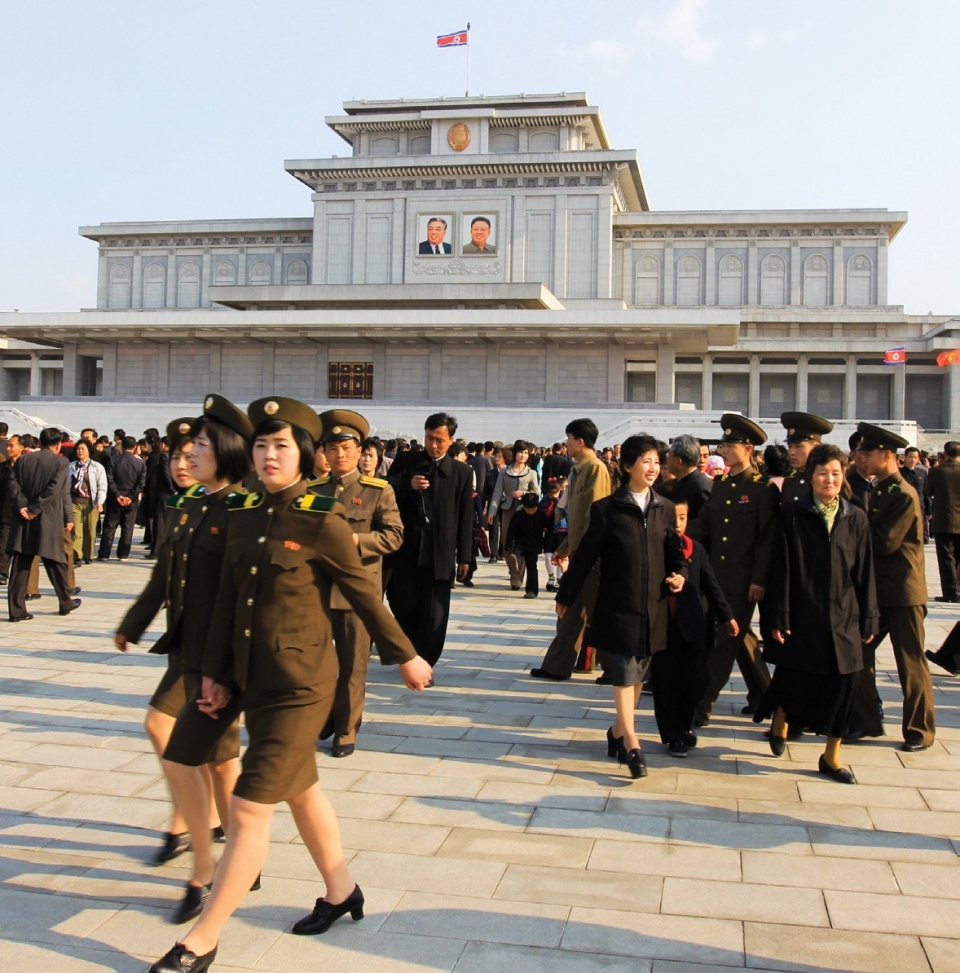
North Koreans on the plaza outside Kumsusan Palace of the Sun, where the body of North Korea’s first president, Kim Il-Sung, lies in state.
JEAN H. LEE ’92, JRN’95
But it was the psychological strain of surveillance that really tested Lee. The hotel room in Pyongyang that she considered home was bugged. “Feeling like anything you said could put you in harm’s way was really difficult,” Lee says.
During early reporting trips, Lee was accompanied by two minders, or, as they preferred to be called, “guides.” Later, the North Koreans she hired to be her drivers, reporters and photographers monitored her activities. “You can choose to be aware of it or be oblivious to it,” Lee says of the surveillance. “But given the amount of time I spent there, and the candid conversations I had with North Koreans, they wouldn’t let me be oblivious. I was privy, and I was made aware of all of that, because I speak Korean.”
And then there was the isolation from the outside world. It wasn’t until 2013 that Lee was allowed to bring a cellphone into North Korea. Before that, like all foreigners, she had to leave her iPhone at the airport, which made her feel “really stranded.” (Word of the tsunami that triggered a nuclear disaster in neighboring Fukushima, Japan, in March 2011 did not reach her in Pyongyang.)
The insular environment made basic journalistic tasks, like filing a story, absurdly difficult. Yet although the state controls all media in North Korea, Lee says she never showed her writing to government officials before publication: “I just told them they could google it, which they did.”
Nonetheless, in a country where hard labor is a common punishment for minor offenses, Lee knew her work could put locals in danger, which meant weighing potential ramifications for her sources. “It was impossible to report properly from North Korea,” says Lee. “You worry what is going to happen to the people you interview and you work with.”
“Who would I have been? How would I have survived?” These questions swirled in Lee’s mind as she traveled around North Korea for the AP, witnessing the poverty and malnutrition in one of the world’s poorest countries. Eager to help her local sources but mindful of U.S. sanctions, Lee limited gifts to baby items, like newborn clothes and soap, which she knew the recipients would not sell on the black market.
“I have an incredible amount of compassion for the North Koreans because they’re not so different from me,” says Lee.
Lee also negotiated the right to distribute foreign reading material, like dictionaries and novels, which is usually forbidden. “I wanted to try to share what North Korea is like today, but I also wanted them to see what America is like today,” she says.
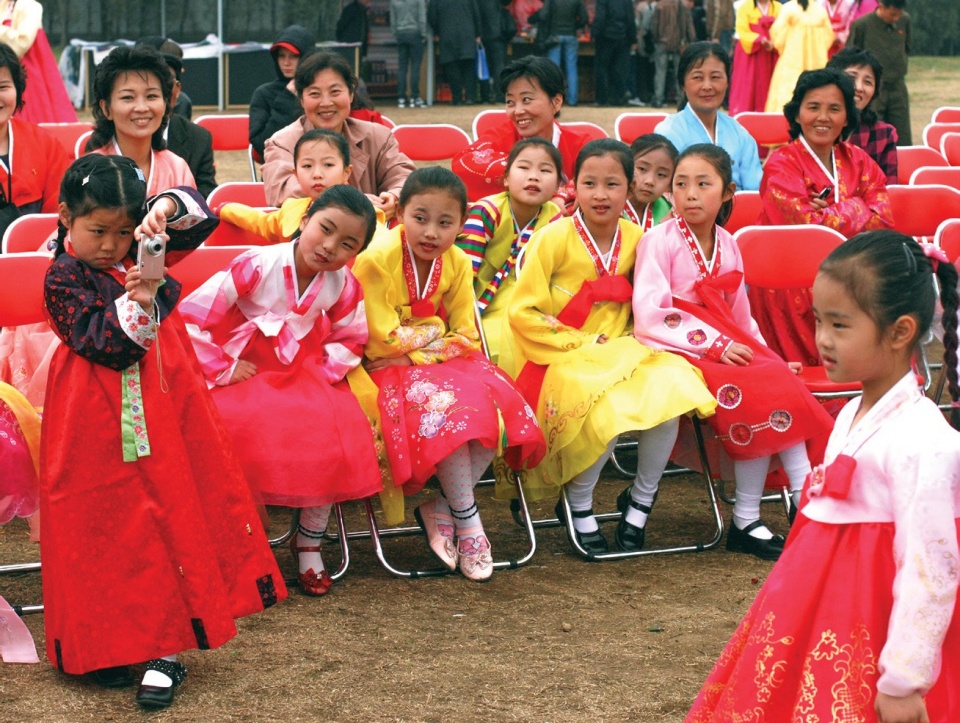
North Korean girls in traditional dress for Kim Il-Sung’s birthday, April 15, known as Day of the Sun.
JEAN H. LEE ’92, JRN’95
Lee’s work was not always well received, however. The AP, which shared office space with state media, drew criticism from journalists and human rights activists for operating in North Korea. But Lee and Guttenfelder defend their work. “As complicated as it was, as imperfect as it was, as challenging as it was, and not being able to work like you would in any other country, I would argue it was very important and valuable to have independent eyes on the ground there,” Guttenfelder says.
It was the psychological strain of surveillance that really tested Lee.
Lee says she was called a propagandist, an accusation she decries as “racist and sexist.” “People took one look at me and saw an Asian woman and assumed I would be a convenient puppet for the regime,” she says. “I was constantly characterized as ‘naive.’ But anyone who knows me well knows how wrong that characterization is. I was the toughest person on our team.
“It’s true that I didn’t get all the access I wanted. North Korea is a tough place to be an American foreign correspondent, especially when it comes to the written word, and it wasn’t easy being the first. But I pushed and got more access than anyone before me.”
Lee grew up in Orono, a suburb of Minneapolis. Her maternal grandfather, a journalist in South Korea, introduced her to the profession. At the College, where she majored in East Asian studies and English, she was on the staff of Spectator each of her four years. “I considered learning the craft of journalism at Spectator just as much a part of my education,” she says.
Equally important was the experience of coordinating Asian Pacific American Awareness Month on campus as a senior, which Lee says proved useful when she found herself organizing reporting trips to North Korea.
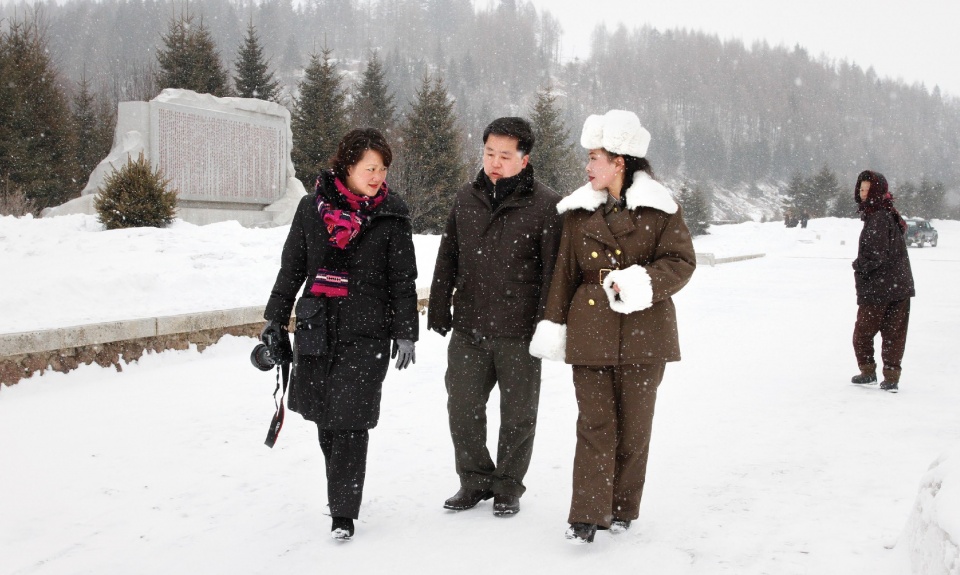
Lee speaking with a tour guide at Mount Paektu, North Korea, in April 2012.
COURTESY JEAN H. LEE ’92, JRN’95
Lee’s post on the Korean peninsula ended in 2013. Staying with the AP would have meant being relocated to another country, but she wasn’t ready to move on from North Korea. “I wanted to take the time to understand what I saw there,” she says.
That’s how Lee ended up at the Wilson Center, which she first joined as a public policy fellow in 2015. She was the director of the Center for Korean History and Public Policy from April 2018 until this year, when she transitioned to senior fellow, which allows her to devote all her energy to research and writing. “My role is to provide context and analysis,” says Lee, adding that she always tries to “position things from the perspective of the North Koreans.”
Lee is still very active in the media world, often as a guest speaker. This year, she was featured in the National Geographic special North Korea: Inside the Mind of a Dictator and the Netflix series How to Become a Tyrant. She also co-hosts The Lazarus Heist, a popular BBC podcast about a high-profile cybercrime that investigators have linked to North Korea.
Yet even as she educates others about North Korea, Lee continues to try to understand it herself. “It’s still this cipher, even for someone like me,” she says.
Nathalie Alonso ’08, from Queens, is a freelance writer and an editorial producer for LasMayores.com, Major League Baseball’s official Spanish-language website.

Published three times a year by Columbia College for alumni, students, faculty, parents and friends.
Columbia Alumni Center
622 W. 113th St., MC 4530, 6th Fl.
New York, NY 10025
212-851-7852
cct@columbia.edu

Columbia Alumni Center
622 W. 113th St., MC 4530, 4th Fl.
New York, NY 10025
212-851-7488
ccalumni@columbia.edu